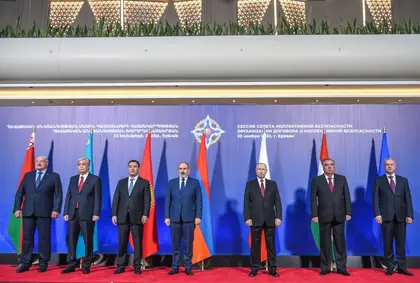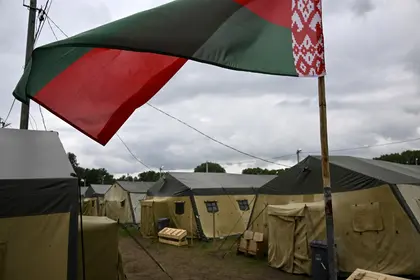Russia has tried to maintain control of many of its former Soviet republics through two bodies that are analogous to similar bodies in the West.
The Russian-led Collective Treaty Security Organization (CTSO) is a military alliance formalized in 2002, that attempts to be Russia’s equivalent to NATO with, currently, six members Russia, Kazakhstan, Kyrgyzstan and Tajikistan, along with Armenia and Belarus.
JOIN US ON TELEGRAM
Follow our coverage of the war on the @Kyivpost_official.
In an echo of NATO’s Article 5 treaty, CSTO’s Article 4 states: “If one of the Member States undergoes aggression, it will be considered by the Member States as aggression to all the Member States of this Treaty… all the other Member States at the request of this Member State shall provide the latter with the necessary help, including military… in accordance with the right to collective defense pursuant to article 51 of the UN Charter.”
Although it has been in existence for over 20 years, the Article has only been used once when a small force deployed to Kazakhstan in January 2022 to deal with political unrest that Moscow categorized as a coup attempt backed by “foreign terrorists.”
Recent events may be the first signs of the cracks appearing in Russia’s hold over their southern partners.
The other body that Russia has used to retain its influence is the Commonwealth of Independent States (CIS) a quasi-equivalent of the European Union that calls itself a regional intergovernmental organization.
It was formed in 1991 following the dissolution of the Soviet Union ostensibly to assist its members’ transition into free democratic nations although, the cynic would say it was an attempt by Russia to keep some semblance of control over its former vassal states.

IOC Admits 15 Russian and 16 Belarusian ‘Neutral’ Athletes to 2024 Olympics
The stated aims of the organization are: to facilitate and strengthen cooperation in the political, economic, ecological, humanitarian, cultural, and other fields among its member states, who are currently: Azerbaijan, Armenia, Belarus, Georgia, Kazakhstan, Kyrgyzstan, Moldova, Russia, Tajikistan, Turkmenistan, Uzbekistan, and Ukraine.
Although Ukraine ceased active participation in the statutory bodies of the CIS in 2018 in protest at Russia’s annexation of Crimea and continued aggression in the Donbas it has never formally withdrawn from the CIS Free Trade Area, even following Russia’s 2022 full-scale invasion.
Recent strains show in the Armenian-Russian relationship
Armenia’s Prime Minister, Nikol Pashinyan, announced on Tuesday that he would not participate in the Nov. 23 CSTO meeting in Minsk, Belarus. Commentators see this as another example of the deteriorating relationship between Yerevan and Moscow.
In 2020 the war between Azerbaijan and Armenia over the Armenian separatist region Nagorno-Karabakh ended with a Moscow-brokered peace plan that included deployment of a Russian peacekeeping force. Armenia became unhappy with the peacekeepers’ reluctance to fulfil their mandate, which was exacerbated by the Kremlin’s refusal to intervene during this year’s outbreak of hostilities.
Pashinyan in turn angered Russia by canceling its hosting of the annual CSTO military exercises, but later held joint exercises with US forces, declined to attend a meeting of the Commonwealth of Independent States (CIS) in Bishkek where Putin made his first trip outside Russia since being indicted for war crimes by the International Criminal Court (ICC) after which Armenia then voted to join the ICC.
According to TASS, Russia’s state media outlet, the former defense minister and head of Armenia’s opposition party, Seyran Ohanyan, accused Pashinyan of threatening the country’s security through this rebuff of Moscow:
“As threats surround us in a complicated military and political situation, not taking part in CSTO events puts Armenia’s security at further risk. We are a member of this alliance. In many cases, Armenian authorities played a part in the deterioration of relations.”
And the Russian-Kazakhstan relationship?
On Nov. 9 at what was called a “routine bi-lateral” meeting between the leaders of Kazakhstan and Russia, Putin was unable, not for the first time, to correctly pronounce Kassym-Jomart Tokayev’s name on several occasions. Perhaps in payback for that and also, in what some commentators have categorized as a power move, gave his closing speech in Kazakh rather than the usual Russian, much to the confusion of the visiting Moscow delegation.
Kazakhstan had earlier hosted a visit by French President Emanuel Macron, as part of his tour of Central Asia, during which deals were agreed in relation to oil and rare earth metals that Kazakhstan has in abundance, as well as pharmaceuticals and aerospace contracts.
With sanctions imposed on Moscow following the invasion of Ukraine having resulted in a major reduction in Russian oil exports to the EU, Kazakhstan is now the EU’s third-largest supplier behind Norway and the US.
At a meeting with President Tokayev, Macron thanked him for not siding with Moscow in its war on Ukraine and commented:
“I don’t underestimate by any means the geopolitical difficulties, the pressures... that some may be putting on you… France values the path you are following for your country, refusing to be a vassal of any power and seeking to build numerous and balanced relations with different countries.”
Kazakhstan and Uzbekistan, where Macron traveled on his next visit, have refused to recognize Russia’s annexation of Ukrainian territories and have pledged to abide by Western sanctions against Moscow.
"The European Union isn’t hiding its intentions to restrain Russia in every possible way and push it out of Central Asia and the South Caucasus.” – Sergei Lavrov
A BBC report quoted the Kazakh political analyst Dosym Satpayev, who said the war in Ukraine had resulted in a diminishing of Russian influence in the region. “There is less military co-operation, the perception of Russia since the war has worsened. Central Asian governments are not talking openly about it – but it is happening.”
Russia in turn has voiced concern at the West’s growing commercial and diplomatic activity in the former Soviet nations of central Asia.
Asked for his views on Macron’s visit and comments, the Kremlin spokesperson Dmitry Peskov said Kazakhstan, as a sovereign state, was free to develop ties with any countries, but emphasized his view that Moscow valued its relations with Kazakhstan “very highly.” He then told reporters: “In our turn, we have historical ties, ties of strategic partnership with Kazakhstan, they are our allies and our interests are united in many international bodies.”
Russia’s foreign minister, Sergei Lavrov, took a less conciliatory line. In an interview broadcast on Sunday, he accused the European Union of attempting to drive Russia out of Central Asia. He said the West was trying to pull Russia’s “neighbors, friends and allies” away from it.
“The European Union isn’t hiding its intentions to restrain [Russia] in every possible way and push it out of Central Asia and the South Caucasus,” he said. “These attempts are futile. We have been historically present there and are not going to disappear.”
Nevertheless, a number of commentators suggest these recent events may be the first signs of the cracks appearing in Russia’s hold over their southern partners.
It is not only the EU nations that are focusing on an area they have long neglected. China is becoming ever more active in Central Asia with its “Belt and Road” project. Turkish President Recep Tayyip Erdogan has also shown growing interest in the region.
You can also highlight the text and press Ctrl + Enter






